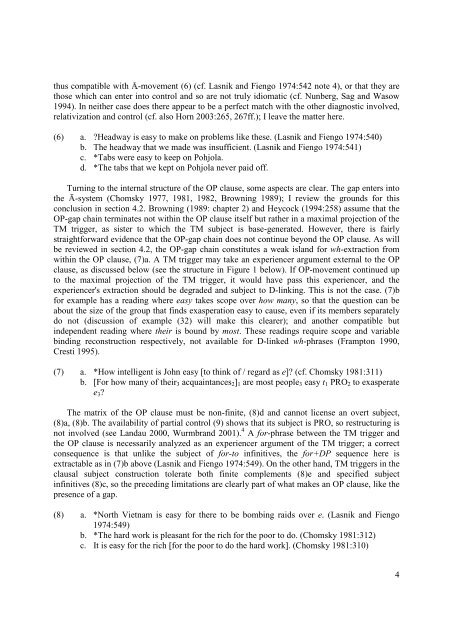1 On tough-movement* Milan Rezac, University ... - Multimania.co.uk
1 On tough-movement* Milan Rezac, University ... - Multimania.co.uk
1 On tough-movement* Milan Rezac, University ... - Multimania.co.uk
Create successful ePaper yourself
Turn your PDF publications into a flip-book with our unique Google optimized e-Paper software.
thus <strong>co</strong>mpatible with Ā-movement (6) (cf. Lasnik and Fiengo 1974:542 note 4), or that they are<br />
those which can enter into <strong>co</strong>ntrol and so are not truly idiomatic (cf. Nunberg, Sag and Wasow<br />
1994). In neither case does there appear to be a perfect match with the other diagnostic involved,<br />
relativization and <strong>co</strong>ntrol (cf. also Horn 2003:265, 267ff.); I leave the matter here.<br />
(6) a. ?Headway is easy to make on problems like these. (Lasnik and Fiengo 1974:540)<br />
b. The headway that we made was insufficient. (Lasnik and Fiengo 1974:541)<br />
c. *Tabs were easy to keep on Pohjola.<br />
d. *The tabs that we kept on Pohjola never paid off.<br />
Turning to the internal structure of the OP clause, some aspects are clear. The gap enters into<br />
the Ā-system (Chomsky 1977, 1981, 1982, Browning 1989); I review the grounds for this<br />
<strong>co</strong>nclusion in section 4.2. Browning (1989: chapter 2) and Hey<strong>co</strong>ck (1994:258) assume that the<br />
OP-gap chain terminates not within the OP clause itself but rather in a maximal projection of the<br />
TM trigger, as sister to which the TM subject is base-generated. However, there is fairly<br />
straightforward evidence that the OP-gap chain does not <strong>co</strong>ntinue beyond the OP clause. As will<br />
be reviewed in section 4.2, the OP-gap chain <strong>co</strong>nstitutes a weak island for wh-extraction from<br />
within the OP clause, (7)a. A TM trigger may take an experiencer argument external to the OP<br />
clause, as discussed below (see the structure in Figure 1 below). If OP-movement <strong>co</strong>ntinued up<br />
to the maximal projection of the TM trigger, it would have pass this experiencer, and the<br />
experiencer's extraction should be degraded and subject to D-linking. This is not the case. (7)b<br />
for example has a reading where easy takes s<strong>co</strong>pe over how many, so that the question can be<br />
about the size of the group that finds exasperation easy to cause, even if its members separately<br />
do not (discussion of example (32) will make this clearer); and another <strong>co</strong>mpatible but<br />
independent reading where their is bound by most. These readings require s<strong>co</strong>pe and variable<br />
binding re<strong>co</strong>nstruction respectively, not available for D-linked wh-phrases (Frampton 1990,<br />
Cresti 1995).<br />
(7) a. *How intelligent is John easy [to think of / regard as e]? (cf. Chomsky 1981:311)<br />
b. [For how many of their 3 acquaintances 2 ] 1 are most people 3 easy t 1 PRO 2 to exasperate<br />
e 3 ?<br />
The matrix of the OP clause must be non-finite, (8)d and cannot license an overt subject,<br />
(8)a, (8)b. The availability of partial <strong>co</strong>ntrol (9) shows that its subject is PRO, so restructuring is<br />
not involved (see Landau 2000, Wurmbrand 2001). 4 A for-phrase between the TM trigger and<br />
the OP clause is necessarily analyzed as an experiencer argument of the TM trigger; a <strong>co</strong>rrect<br />
<strong>co</strong>nsequence is that unlike the subject of for-to infinitives, the for+DP sequence here is<br />
extractable as in (7)b above (Lasnik and Fiengo 1974:549). <strong>On</strong> the other hand, TM triggers in the<br />
clausal subject <strong>co</strong>nstruction tolerate both finite <strong>co</strong>mplements (8)e and specified subject<br />
infinitives (8)c, so the preceding limitations are clearly part of what makes an OP clause, like the<br />
presence of a gap.<br />
(8) a. *North Vietnam is easy for there to be bombing raids over e. (Lasnik and Fiengo<br />
1974:549)<br />
b. *The hard work is pleasant for the rich for the poor to do. (Chomsky 1981:312)<br />
c. It is easy for the rich [for the poor to do the hard work]. (Chomsky 1981:310)<br />
4
















